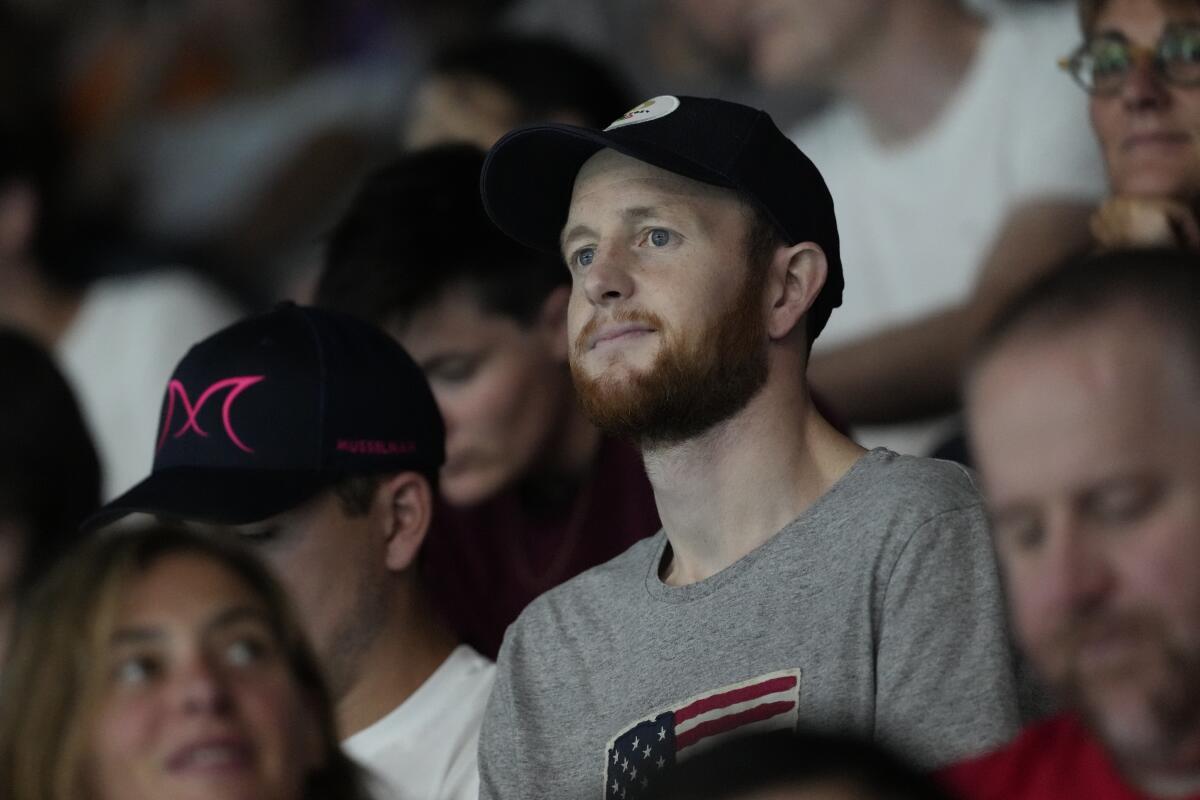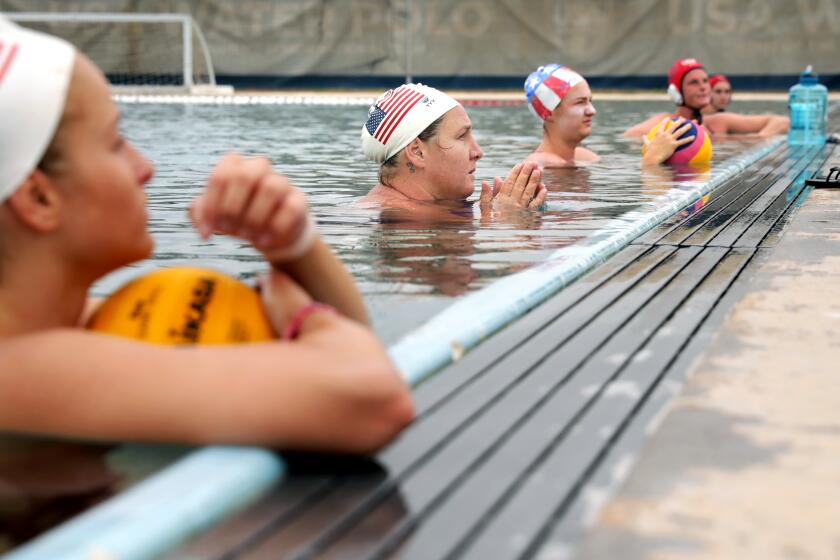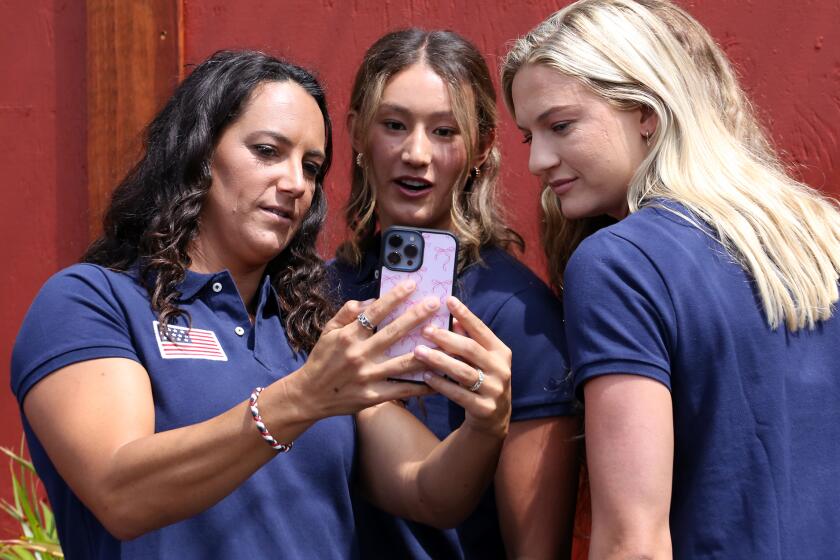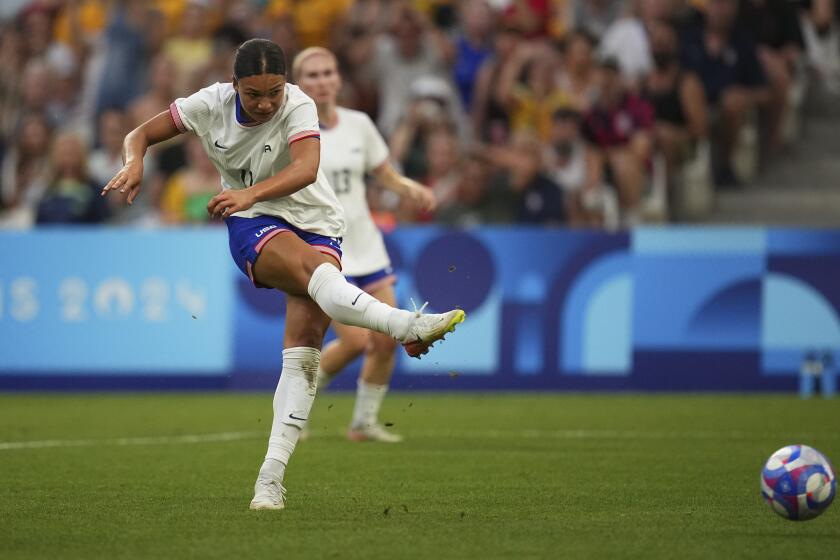U.S. women’s water polo team beset by tragedies keeps rare Olympic loss in perspective

- Share via
NANTERRE, France — Maddie Musselman lost a water polo game Thursday.
Not just any game, mind you. It was a semifinal of the Paris Olympics and her U.S. team lost in the cruelest way possible, in the sixth round of a penalty shootout. For someone who has never known anything but the top step of the medal podium at the Olympics, the 14-13 loss to Australia had to be devastating.
But it wasn’t because, as she quickly reminded anyone who would listen, it was only a game. Last fall Musselman’s husband, Pat Woepse, was diagnosed with stage 4 lung cancer and was unsure he’d be able to travel to France to root for his wife.
He was there Thursday to see her lose, which in Musselman’s book was a win.
“I’ve been through a lot outside of sport right now. So it’s been easy to have that perspective,” the two-time Olympic champion said after Australia goalie Gabriella Palm saved her penalty try, ending the game.
“Life is precious for me right now. And so for me,” she added, her voice cracking, tears welling in her eyes, “a loss right now is obviously hard. But moving forward.”

Maggie Steffens was going for her fourth straight gold medal. No team, much less any player, had ever done that in Olympic water polo. But shortly before the team’s first game in Paris, Lulu Conner, Steffens’ 26-year-old sister-in-law, suffered a fatal medical emergency in Paris.
That was a loss. Thursday’s game was just a result.
“There’s been a lot of adversity outside of water polo that we faced,” said Steffens, who dropped a bouquet into the Seine during the opening ceremony in Conner’s memory. “We’ve been through a lot and done a great job of being there for one another.
“And now we get another chance to do that and show, ‘Hey, that was tough.’ But this isn’t anything new. Now we just need to come back, be stronger.”
Few Olympic teams in any sport have had to rebound more times or overcome adversity more often than the U.S. women’s water polo team, the most successful in the world in the pool and the most star-crossed outside it.
One player’s mother had a stroke. Another was a survivor of a mass shooting. Overcoming tragedy has strengthened the U.S. women’s Olympic water polo team.
Its coach, Adam Krikorian, lost his brother, Blake, to a heart attack just before the 2016 Rio Games opened, then returned to Brazil to learn that the mother of star defender Melissa Seidemann suffered a stroke and was in a Rio hospital.
A year later, a gunman opened fire on a country music festival in Las Vegas attended by Seidemann, Musselman and a teammate, killing 59 and wounding more than 400. Another player survived a terrorist bombing in a Belgian train station and a balcony collapse at a hotel in South Korea that killed two people and nearly ended the career of Paris Olympian Kaleigh Gilchrist, leaving her facing long bouts of mental and physical therapy.
Each time the players rallied around one another — perhaps more so around Steffens and Musselman in Paris. After all, they’ve had a lot of practice.
“This,” Kirkorian said of the game, “this is just another test. This is what life is; the reality of life. You don’t stand on top of the podium every single time. We’ve made it look easy at times, but it’s never been easy. We lost to a better team today.
“In these heartbreaking moments, you’ve got to learn from it. You’ve got to put it in perspective. We’ll be devastated a bit, but this group is made of high-integrity, high-class women. And I know that they’ll bounce back just fine.”
Maggie Steffens, arguably the greatest women’s water polo star of all time, isn’t afraid to ask for help showcasing one of Team USA’s top squads.
They don’t have much time; the bronze-medal game with the Netherlands is Saturday, before Spain and Australia play for the gold.
“What an opportunity to fight for a bronze medal with this group and learn from it,” Musselman said.
It wasn’t supposed end this way, of course — and for much of Thursday at La Defense Arena, on the western edge of Paris, it didn’t look as if it would. With Musselman scoring in each of the first two periods — giving her a team-high11 goals for the tournament — the U.S. built a three-goal lead by halftime. Ashleigh Johnson, the best goalie in the tournament, was treading water in front of the net, so that advantage looked safe.
But Australia’s Abby Andrews eased that deficit by herself, scoring three times in a four-minute span of the third period. A goal from Steffens put the U.S. back in front heading into the fourth period. And when Rachel Fattal doubled the advantage 45 seconds later, the Americans looked safe once more.
But they wouldn’t score again, allowing Australia’s Bronte Halligan to tie the game with a pair of goals, the final with 2:54 to play.
The U.S. women’s soccer team heads into its Olympic quarterfinal match against Japan undefeated and leading the tournament in goals.
Australia was perfect in the shootout, although Andrews’ shot in the second round deflected in off Johnson’s hand and another from Tilly Kearns skipped just under her left arm. So when Musselman, who made her first penalty, couldn’t get her second by Palm, the Australian celebration began.
For a U.S. team that had so many women playing with a heavy heart, the result, Musselman said, was “heartbreaking.”
“Because of the vision that you have for your group and for your team and where you want to be,” she said. “But at the same time, on to the next.”
“This is a tough loss,” Krikorian added. “But we’ll take it like the grown-ups we are and I think we’ll be better because of this. Maybe not better water polo players, but we’ll learn from it as people and as human beings.”
They’ve already learned the hard way that it’s only a game.
More to Read
Go beyond the scoreboard
Get the latest on L.A.'s teams in the daily Sports Report newsletter.
You may occasionally receive promotional content from the Los Angeles Times.










